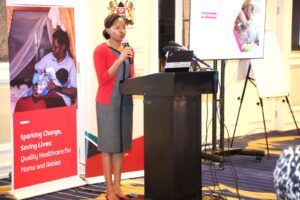
Amref Health Africa in Kenya has launched the Maternal and Newborn Health (MNH) Big Bet initiative, aptly named Sparking Change, Saving Lives – Quality Healthcare for Moms and Babies.
This is a bold stride towards reducing the high rates of maternal and newborn mortality in Kenya and accelerating progress towards achieving the Sustainable Development Goals (SDGs) Commitments.
The groundbreaking initiative was unveiled at a high-profile roundtable meeting held at Villa Rossa Kempinski, bringing together Governors from various counties, particularly those grappling with high maternal and newborn deaths.
The Maternal and Newborn health Big Bet aims to forge new alliances to spearhead
investment and execution of transformative strategies, with a resolute focus on
enhancing the survival and well-being of expectant mothers and newborns in Kenyan
counties. Investments are needed to achieve these ambitious targets. Furthermore, the
initiative endeavors to enlist the support of Kenyan governors, particularly from regions
burdened with high maternal and newborn deaths, to champion maternal health and
accord it paramount importance within their jurisdictions. In this initial phase, we will collaborate with counties that face the greatest burden. They include – Tana River,
Garissa, West Pokot, Elgeyo Marakwet, Machakos, Homabay, Siaya, Wajir, Kilifi,
Murang’a, Makueni, Migori, and Turkana counties.
Despite commendable strides in improving maternal and newborn health in Kenya,
recent statistics from the Kenya Demographic and Health Survey (KDHS, 2022) on maternal mortality ratio currently stands at 355 per 100,000 live births and Neonatal mortality rate stands at 21 per 1000 live births. These figures are far from the from the SDG target of 70 per 100,000 live births and 12 per 1000 live births by 2030 respectively. Notably, 24 health facilities across the13 counties contribute significantly to the persistently high rates of maternal and neonatal deaths in Kenya (Kenya Health Information System).Under the Maternal and Newborn health Big Bet, Amref Health Africa has identified four
pivotal game-changers aimed at addressing the high number of deaths, ensuring
healthy pregnancies and safe deliveries in 60 referral health facilities across highburden counties. These game-changers include the establishment of High Response Maternity Units, strengthening response systems for neonatal emergencies,
strengthening Primary Health Care, and strengthening accountability for every mother and newborn.
“To achieve the set target, there is need for greater investments in maternal and
newborn health by ecosystem players” said Dr Meshack Ndirangu, Country Director,
Amref Health Africa in Kenya.
Dr. Ndirangu also underscored the strategic alignment of these game-changers with
Amref’s 2023-2030 strategic plan, which aims to transform the health of communities
through Primary Health Care with a focus on women and young people. Furthermore, it aligns to the Kenyan Government’s commitment towards realization of Universal Health Coverage (UHC) and commitments in Ending Preventable Maternal Mortalities and
Every Newborn Action Plan.
Speaking during the launch, H.E. Wisley Kipyegon Rotich, Governor, Elgeyo Marakwet County expressed optimism in achieving zero maternal mortality in Kenya and thanked Amref for the leadership. “We are grateful to Amref Health Africa for their support in driving us towards zero preventable maternal and child deaths. Drawing from the Ministry of Health’s insights, we, the governors and health committee, commit to support the MNH Big Bet Initiative and work towards zero maternal mortality rates in our counties,” he said.
“To achieve this, it is crucial to leverage on data-driven approach, leveraging AI enabled
data analytics within heath management systems for targeted interventions. Blanket
interventions are no longer sufficient. Additionally, we acknowledge the importance of infrastructure development, including a strong network of Community Health Promoters (CHPs) – our true ambassadors in the field,” said Governor Rotich.
Investing in maternal and newborn health transcends moral obligation; it represents a
savvy financial decision. According to the Global Strategy for Women’s, Children’s, and
Adolescent’s Health 2016-2030, every US$1 invested yields a remarkable return of
US$9 in economic and social benefits. Notably, households affected by maternal
mortality expend approximately one-third of their annual per capita consumption
expenditure on healthcare, underscoring the urgent need for targeted interventions to break the cycle of poverty resulting from maternal mortality.

